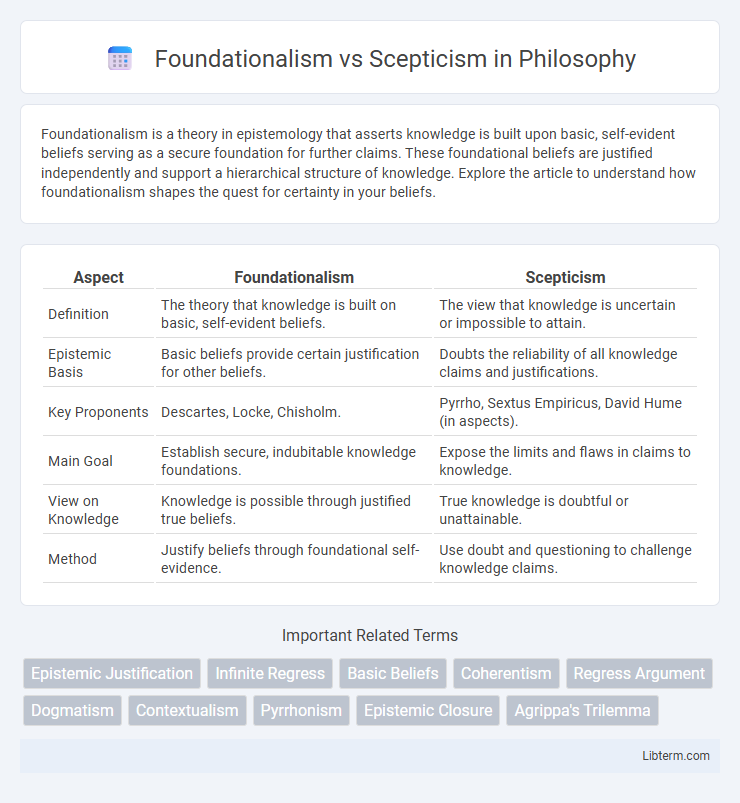Foundationalism is a theory in epistemology that asserts knowledge is built upon basic, self-evident beliefs serving as a secure foundation for further claims. These foundational beliefs are justified independently and support a hierarchical structure of knowledge. Explore the article to understand how foundationalism shapes the quest for certainty in your beliefs.
Table of Comparison
| Aspect | Foundationalism | Scepticism |
|---|---|---|
| Definition | The theory that knowledge is built on basic, self-evident beliefs. | The view that knowledge is uncertain or impossible to attain. |
| Epistemic Basis | Basic beliefs provide certain justification for other beliefs. | Doubts the reliability of all knowledge claims and justifications. |
| Key Proponents | Descartes, Locke, Chisholm. | Pyrrho, Sextus Empiricus, David Hume (in aspects). |
| Main Goal | Establish secure, indubitable knowledge foundations. | Expose the limits and flaws in claims to knowledge. |
| View on Knowledge | Knowledge is possible through justified true beliefs. | True knowledge is doubtful or unattainable. |
| Method | Justify beliefs through foundational self-evidence. | Use doubt and questioning to challenge knowledge claims. |
Understanding Foundationalism: Core Concepts
Foundationalism posits that knowledge is built upon basic, self-evident beliefs that act as a foundation for other justified beliefs, ensuring a stable structure for knowledge acquisition. These foundational beliefs must be infallible or undeniable to prevent infinite regress in justification, distinguishing them from assumptions or unsupported claims. Understanding foundationalism requires recognizing its role in epistemology as a counter to scepticism, which challenges the possibility of certain knowledge by questioning the reliability of all beliefs.
Scepticism Defined: Philosophical Roots
Scepticism, rooted in ancient Greek philosophy, challenges the possibility of certain knowledge by questioning the reliability of sensory experience and rational deduction. Early philosophical sceptics, such as Pyrrho and Sextus Empiricus, argued that human perceptions are inherently fallible, thus suspending judgment to attain mental tranquility. This foundational questioning critically contrasts with Foundationalism, which seeks indubitable beliefs as the basis for knowledge.
Historical Background: Foundationalism vs Scepticism
Foundationalism, rooted in classical philosophy with key figures like Descartes and Aquinas, posits that knowledge rests on basic, self-evident beliefs or axioms that provide a secure foundation for further knowledge. Scepticism, notably advanced by Pyrrho and later philosophical skeptics, challenges the possibility of certain knowledge, questioning the reliability of sensory experience and reason. The historical debate between foundationalism and scepticism centers on whether indubitable foundations for knowledge exist or if all claims to knowledge remain uncertain and open to doubt.
Key Proponents and Their Arguments
Foundationalism, championed by figures such as Rene Descartes and John Locke, asserts that knowledge is built upon indubitable basic beliefs serving as a secure foundation for all other knowledge. In contrast, scepticism, notably advanced by David Hume and Sextus Empiricus, challenges the possibility of certainty in knowledge, arguing that human senses and reason cannot provide absolute justification. Descartes' methodological doubt aimed to discover foundational truths, whereas Hume's empirical scepticism highlights the limitations of inductive reasoning and the problem of justifying causal inferences.
Epistemic Justification in Foundationalism
Foundationalism asserts that epistemic justification rests on basic beliefs that are self-evident, infallible, or evident to the senses, providing a secure foundation for all other beliefs. These foundational beliefs justify non-basic beliefs through logical inference or empirical support, ensuring a structured and stable knowledge system. In contrast, scepticism challenges the possibility of certain or justified knowledge, often questioning whether foundational beliefs themselves can be truly justified.
The Sceptical Challenge to Knowledge Claims
The sceptical challenge to knowledge claims underscores the problem of justifying beliefs with certainty, questioning whether any knowledge can be truly foundational. Foundationalism attempts to counter scepticism by positing basic beliefs that are self-evident, infallible, or evident to the senses as the secure foundation for further knowledge. However, sceptics argue that these supposed foundational beliefs themselves require justification, exposing a persistent epistemic circularity or infinite regress in knowledge justification.
Reliabilism and Alternatives to Traditional Foundationalism
Reliabilism challenges traditional foundationalism by asserting that beliefs are justified if produced by reliable cognitive processes rather than resting on indubitable foundations. This approach shifts epistemic justification from infallible basic beliefs to trustworthy methods like perception and memory. Alternative theories, such as coherentism and infinitism, further reject the notion of certain foundations by emphasizing the interdependence of beliefs or an infinite regress of justification, expanding the landscape beyond classical foundationalism and scepticism.
Infinite Regress Problem: Foundationalist Responses
Foundationalism addresses the Infinite Regress Problem by positing basic beliefs as self-evident, infallible, or indubitable foundations that justify other beliefs without requiring further support. These foundational beliefs act as epistemic bedrock, halting the regress of justification and providing a secure starting point for knowledge acquisition. By contrast, scepticism challenges the possibility of such secure foundations, arguing that without them, justification either leads to infinite regress or circular reasoning.
Contemporary Debates: Bridging Foundationalism and Scepticism
Contemporary debates on foundationalism and scepticism explore efforts to reconcile core aspects of both epistemological positions by refining the criteria for basic beliefs and justifying knowledge claims despite radical doubt. Philosophers employ methods such as contextualism and coherentism to bridge foundationalist structures with sceptical challenges, emphasizing the role of epistemic justification that is both indubitable and fallible. This ongoing discourse addresses the limits of human knowledge while proposing frameworks that incorporate foundational beliefs grounded in perceptual or inferential certainty.
Implications for Modern Epistemology
Foundationalism asserts a structure of knowledge built on indubitable basic beliefs, providing a secure basis for justification that counters scepticism's demand for absolute certainty. Scepticism challenges the possibility of certain knowledge, prompting modern epistemology to refine criteria for justification and knowledge claims rather than seek absolute proof. This dynamic fosters contemporary approaches like fallibilism and coherentism, which balance the foundationalist desire for firm ground with sceptical rigor on epistemic humility.
Foundationalism Infographic

 libterm.com
libterm.com